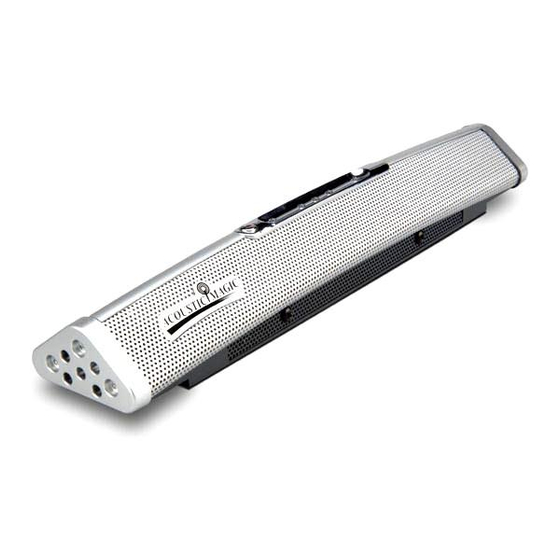Acoustic Magic Voice Tracker 2 II Manual de início rápido - Página 3
Procurar online ou descarregar pdf Manual de início rápido para Microfone Acoustic Magic Voice Tracker 2 II. Acoustic Magic Voice Tracker 2 II 4 páginas. Array microphone

Voice Tracker™ II INSTRUCTIONS
Included Components
The Voice Tracker II comes with a USB cable (primary
audio connection), one 6 ft audio cable and a 3.5mm
splitter (for the AEC reference connection) and a ceiling
mount. A second audio cable, a USB wall power supply,
and a DB9 serial cable are options, which may be
required for certain application configurations.
General Microphone Setup
For simple microphone operation, just connect the Voice
Tracker II array microphone to a computer using the
USB cable. Power for the Voice Tracker II is provided
from the computer through the USB connection. Audio
output is through the USB connection: the PC's audio
record setup must be configured to receive USB audio
input from the "Voice Tracker II" connection.
Full Duplex VoIP telephony/conferencing Setup
If the Voice Tracker II is connected to a computer
running a VoIP application like Skype or Adobe Connect,
it will enhance the telephony/conferencing experience by
eliminating acoustic echo. Acoustic Echo occurs when
the far end talker's voice is picked up by the open mic
and sent back to him as an echo. For full duplex
operation, a sample of the far end talker signal must be
transmitted to the Voice Tracker II (for acoustic echo
cancellation) by the audio cable. This signal is obtained
by using the included splitter so part of signal from the
speaker out jack on the PC goes to the Voice Tracker's
reference in jack, and the other part goes to an external
speaker.
Make the reference connection to the VT II before the
USB (or analog audio) connection so that the USB
"connect sound" turns on the AEC. Otherwise, AEC may
take a few seconds to engage.
For optimum echo cancellation, the loudspeaker should
be at least 1 Meter from the Voice Tracker.
A view of the connections for full duplex operation is
shown in figure 1. Note: connection can alternatively be
made thru analog cable from audio out jack
Figure 1 – Audio and AEC Connections
Setup for Analog output
If the Voice Tracker II is to be connected to devices that
require an analog signal (such as a handheld recorder or
video camera), its output is available in analog format at
mic level or line level through the "Audio Out" 3.5 mm
jack. The included audio cable could be used for this
connection if AEC isn't used; otherwise, a 2
cable will be required.
If analog output in used, power needs to be provided by
connecting the USB cable to an optional USB wall power
converter, like our part 201. Getting power from a PC
can introduce noise in the analog audio signal
The toggle switch on the unit allows selection of mic
level or line level analog output, or close range/long
range USB audio output. If the switch is used to change
output levels, the Voice Tracker II must be rebooted
(powered off and then on).
Position Lights
The green position lights provide feedback on the
operation of the array. They indicate where the array's
listening beam is pointing. When the array recognizes a
relevant sound, one of the 5 lights will be illuminated.
For example, if a talker is directly in front of the array,
the middle light will be illuminated. If the talker is to one
side, a light on that side will turn on. If the talker moves
across the field of view of the array, the lights will track
the talker's motion. When two users are sharing the
array, the light will indicate the direction of the active
talker. When there is no active talker, the LEDs will be
off.
Controls
The Voice Tracker II has a pushbutton mute switch.
Press the button once to put the Voice Tracker II into
mute mode.
(continuously), indicating that the microphone is in mute
mode. Press the button again to return to microphone to
listening mode (the LEDs will indicate the active talker).
Figure 2 – Mute Button and Connectors
Positioning
www.icons.net.in
The
five
green
LEDs
MuteButton
DB9
nd
audio
will
blink
